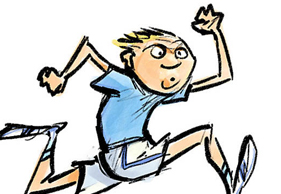A Modern Athlete reader, Allistair Meyer,
recently asked the following very interesting question: “As simple as it might
sound, I have tried to apply the ‘start slow, finish fast’ concept, especially
during marathons. Logic tells me that if I start slow and run for almost three
hours, how is it possible to have the strength to finish my last hour fast with
at least 10km remaining?”
THE COACH’S TAKE
I personally believe that the phrase should actually
be START SLOWER and FINISH FASTER than your planned race pace. Speed is
relative to the individual’s running ability, age and many other factors. Most
running records are achieved using EVEN pacing. Take, for example, Roger Bannister,
the world’s first sub- four-minute miler.
When trying to break this barrier, Roger set out by
trying to run each lap (a quarter mile) around the track in just under 60 seconds
with enough in the tank to finish fast and break the four-minute barrier. He
achieved this when his training mates paced him through three laps in 3:01. He
ran the last lap in just under 59 seconds to finish in 3:59.4, and with that he
made history! In this epic race, the runners did not start slow at all, but ran
an even pace and finished fast! This is the secret to your best times.
PACING EQUATION
My personal best marathon was achieved with only a 20-second
slowdown between the first 21km and the second 21km, so very close to even
pace. Of course, in road races one has to take into account a lot of other
factors, such as up hills, down hills, distance and the weather, to name a few.
History shows that starting fast more often than not
leads to a complete slowdown towards the end of a race. Therefore rather start
at a slightly slower pace than your predicted even pace for 25 to 35% of the
distance, pick up the pace over the next 35 to 50% of the distance, and then
try to maintain that to the finish. If you have managed your muscle fatigue and
energy levels, you may even be able to pick up the pace during the last few
kilometres for a fast finish.
TRAIN TO ACHIEVE THIS
If you do not practise this concept in training, you
will never be able to do this in a race.
?
Start
slow, finish fast: Every
run, even your easy recovery runs, should start at a very easy pace and finish
faster than you started.
?
Easy
out, fast back: Run easy
for the first 4km. Stop and have a drink and then run the same 4km back at
around two to three minutes faster.
?
Progressive
runs: Do a 60-minute workout, increasing
the pace every 20min: The first 20min should be easy, the next 20min at a good
pace and the last 20min at tempo pace.
?
Very
fast finishes: Do a
steady run of around 10km with the last five minutes at a very fast pace.
Lastly a concept that I constantly talk to my runners
about is that running easy must be EASY and running fast must be FAST! There
must be a notable difference between the efforts, and this will build your
fitness. Good luck with your training.


